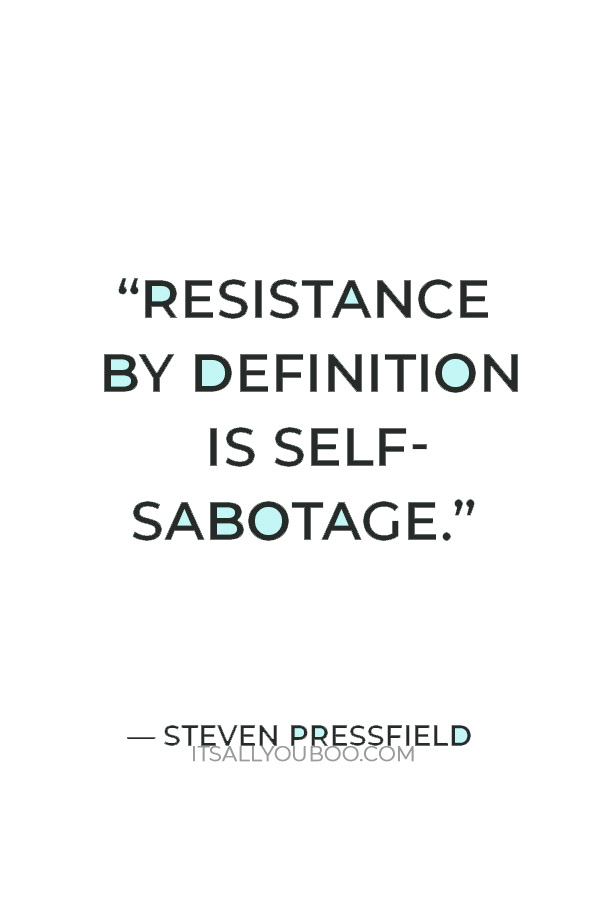How can I stop self-sabotaging myself? What are my self-sabotaging behaviors?
If you’ve ever set out to achieve a goal only to freeze up, forget about it, discourage yourself, or do something to “ruin” it, you might be more familiar with the destructive habit of self-sabotage than you think.
You might find yourself in a pattern of procrastinating, self-medicating with substances, eating your feelings, or even self-harm. You might not even be aware that you’re self-sabotaging yourself with these behaviors! Many people aren’t.
But when they create problems in your daily life or stand in the way of your long-term goals, then these self-sabotaging habits need immediate attention.
The good news is that it’s perfectly possible to learn how to stop sabotaging yourself and build healthier habits that support your goals.
This can be done through behavior adjustment, strengthening self-regulation, and becoming aware of how short-term habits have everything to do with being on track for your long-term goals. Let’s see how!
This post is all about how to stop self-sabotaging yourself.


THIS POST MAY CONTAIN AFFILIATE LINKS.
IF YOU MAKE A PURCHASE FROM THESE LINKS, I MAY EARN A SMALL COMMISSION.
CLICK HERE FOR MY FULL DISCLAIMER STATEMENT.
What Does It Mean to Self-Sabotage Yourself?
In simple terms, self-sabotaging is when you undermine your own goals and values. So say you have your eye on a goal and you know exactly what you want. You know you want to obtain your degree. But then you turn around and do something that conflicts with this. Say, skipping assignments in your classes all the time. When you self-sabotage, your goals, and actions aren’t in alignment.
You should know that self-sabotaging is a form of behavioral dysregulation. This can be conscious, such as deciding to forego your exercise routine when you know your goal is to lead a healthier lifestyle. Or it can be unconscious, like finding yourself regularly starting assignments an hour before they’re due out of an underlying fear of failure.
Now that you have a grasp on what it means to self-sabotage yourself, you’re probably curious about why the heck you engage in sabotaging behavior in the first place! Let’s take a look at the psychology behind this frustrating habit you need to unlearn.
👉🏽 RELATED POST: How to Break A Bad Habit

Why Do I Self Sabotage?
There are many reasons why you might find yourself partaking in self-sabotaging habits and addressing these sabotaging behaviors is essential to overcoming them.
There’s not really one universal reason why you might self-sabotage (I know, I wish it were that easy!). It’s very context-dependent and can occur for a huge variety of reasons.
A common example of self-sabotage is getting into a romantic relationship with someone that’s incompatible with you but makes you feel superior in some way. This is self-sabotage in the sense that you’re investing in a relationship that doesn’t work, but it boosts your ego or alleviates your low self-confidence. Short-term benefit, long-term dissatisfaction.
If this is happening in spite of your desire to form a healthy romantic relationship, then that’s a sign that your goals and actions aren’t in agreement. This is a clue that this discrepancy is going to take some addressing!
But you can also self-sabotage yourself for reasons like…
- You want to escape uncomfortable feelings
- You haven’t been taught how to manage (or process) difficult thoughts and feelings
- You’ve made a habit of turning to sources of temporary relief through negative coping mechanisms, like drugs/alcohol, avoidance, aggression, etc.
Common Self Sabotaging Thoughts
So, what are some self-sabotaging thought patterns you should look for in yourself?
If your mindset starts gravitating toward any of the following self-sabotaging thoughts, you’ll want to catch yourself and consider reframing these thoughts in a more productive, positive way.
👉🏽 RELATED POST: How to Be Comfortable With Yourself

- “I know I have this deadline coming up, but I don’t feel like working on it.” This is procrastination at its finest. And we all procrastinate from time to time, but it’s important not to let it progress into a habit that self-sabotages our work ethic, success, or achievements. You’re delaying something even though you know it’s better to work on it.
- “I can’t stop worrying about the outcome.” Let’s consider why we’re driven to worry about our problems. Worrying can give you a false sense of control over a situation because you feel like you’re doing something active about it (you’re actively thinking about it, rather than ignoring it). But worrying excessively or chronically is hardly ever productive, and it can cause heightened anxiety in the long run.
- “I feel like I need a few drinks after work to cope with the day.” Alcohol in moderation, and used for the right reasons (and not as a means to self-medicate), can be fine. But feeling like you need the temporary relief of 2 or 3 drinks to manage at the end of the work day is a different story. At best, this can interfere with your ability to be present with your family in the evening. At worst, it can be the slippery slope to addiction.
- “It feels easier to avoid my problems than face them head on.” While I can totally agree that it feels this way, unaddressed problems always come back to bite you later, and it’s just not worth it. Avoiding responsibilities can stem from a deep-rooted fear of failure. And avoiding problems you’re facing can stem from improper emotional regulation or conflict resolution skills.
How Can I Stop Self-Sabotaging Myself?
Now for the million-dollar question: how can you stop self-sabotaging yourself?
You just learned the what and why behind self-sabotage, which is an important step for documenting and analyzing your behavior. Recognizing and understanding your habits and behavior is crucial to stop the pattern of self-sabotage in its tracks before you get in your own way.
👉🏽 RELATED POST: 12 Secrets To Always Being Happy

5 Ways to Stop Self Sabotaging Yourself
#1. Identify Your Self Sabotaging Habits and Behaviors
The first step in learning how to stop self-sabotaging yourself is to think about how you typically approach and carry out your goals.
- Do you check in on your progress toward a goal often?
- Do you usually stick to a goal?
- Or do you not even set goals in the first place?
(If not, don’t beat yourself up about it! We all start somewhere! It’s more important to simply recognize where you’re at, rather than pass judgment on yourself.)
Do you suffer from a lack of motivation? Put off making decisions in certain areas? These are all important pieces of information to consider. You’ll want to assess your attitude, mindset, and behavioral patterns to identify areas of improvement.
#2. Recognize Which Need You’re Attempting to Fill By Using Self Sabotage
Instead of being tough on yourself, work constructively to discover why the self-sabotaging behavior makes sense to you. It’s clearly serving a function to you in some way, otherwise, you wouldn’t ever participate in negative behavior.
For example, if you consistently feel inclined to drink after the workday, you need to understand that you’re doing this to alleviate stress. This means that stress tolerance and management are a struggle for you, so that’s the problem area to address in this instance.
👉🏽 RELATED POST: How to Silence Your Inner Critic

If you’re a chronic procrastinator, ask yourself “am I only procrastinating because I’m avoiding the possibility of failure?” It can be really hard to admit to a fear of failure. I never thought this was something I struggled with until I dug deeper and realized that several of my unhelpful behaviors were a result of my fear of failure.
While it was unpleasant to come to terms with, it was the necessary step in moving forward with fixing my own self-sabotaging habits.
#3. Have a Go-To List of Healthy Alternative Behaviors That Fill The Lacking Need
Now that you understand the underlying need that isn’t being met, brainstorm ways you can meet that need through healthier habits. You never want to ignore or push the underlying need away. You’re acting out through self-sabotage for a reason, so it’s essential to address the root cause and modify how you respond to an unmet need. This is a must to finally stop self-sabotaging yourself.
Say you’ve just been informed of stressful news that affects your personal life. You’re anxious, you’re overwhelmed, maybe even a little bit panicked. Your first instinct is to binge eat, even though you know you’ll feel crummy after. So what else can you do to alleviate the stress of the news? (And in a way that will actually make you feel good?!)
Here’s a great list of ideas to fill the lacking need for stress-relief:
- Take deep breathes and meditate
- Journal to organize your thoughts
- Take a warm, soothing bath
- Do a calming activity like painting, reading, or putting together a puzzle
- Get some exercise
- Go for a walk
- Vent to a supportive friend
You can make lists like these for any unmet need. Sometimes we resort to unhelpful behaviors because we don’t have the energy to think of alternative healthy behaviors. This is why it’s wise to create lists like these when you’re in a calmer frame of mind.
👉🏽 RELATED POST: Healthy Lifestyle Changes to Make

#4. Reframe Negative Thoughts and Self-Talk
While a lot of self-sabotage deals with behaviors, your mindset and thoughts can play just as much of a role. You might be acting out in ways you’re unhappy with because your thoughts and self-perception aren’t where they should be. You’ve gotta work on both behavior and the emotions and thoughts that lie behind it in order to stop self-sabotaging yourself.
If negative inner-dialogue is a cause for your self-sabotage, you’ll want to work to reframe the negative self-talk into logical positive affirmations.
Say you have a tough interview coming up, and you think, “there’s no way I’ll get the job. I’ll have to settle on everything my whole life.” Is it really true that there’s no way you’ll get the job? And even if you don’t get the job, what makes you think this is an indication of needing to settle for your whole life? It’s helpful to identify whether or not the negative thought is coming from a place of logic.
Instead, you can say to yourself, “I’m perfectly qualified for this job. I am capable of landing it. And if I don’t, I won’t settle for something worse. I’ll keep searching for a job I’m happy with!”
Unhealthy thought patterns, just like in the interview example, affect so many of us. My post on 10 Unhealthy Thought Patterns and How to Change Them will help you understand more about how to fix the negative self-talk that holds you back!

#5. Have a Game Plan for How You’ll Implement Healthier Behaviors
Life gets busy. Stuff comes up. So how will you stick to your new, self-sabotage-free habits in spite of the challenges? I’ll tell you: you get specific.
Because what happens when you meant to eat healthily, but you forgot to buy groceries for your meal prep? What happens when you meant to call that friend instead of drinking to numb the pain, but that friend isn’t available?
You have to plan for obstacles like these. If eating healthy is a priority to you, you can schedule a regular weekly occurrence in your calendar to buy groceries so you don’t forget and end up resorting to McDonald’s. If you know how much better you’ll feel after talking to a friend instead of drinking, make a backup list of 2-3 others you can call if your main BFF isn’t available.
Being specific and coming up with well-thought-out plans for how you’ll instill positive habits will only increase the likelihood of you sticking to your goals and help you to stop self-sabotaging yourself! This way, you can’t make excuses for why things didn’t go according to plan or why you fell off the wagon.
👉🏽 RELATED POST: Top 10 Best Morning Habits

Start Your Journey to Self-Support Today
The moment you stop self-sabotaging yourself is the moment you can work toward unlocking your full potential. We could all use more of what propels us toward self-growth and less of what stifles our development.
So it’s essential to choose healthier behaviors, a more productive mindset, and plenty of self-love over things that provide short-term relief but long-term dissatisfaction.
Get Your Be Positive Affirmations
Ready to embrace your inner positivity? Get your FREE 20 Printable Positive Affirmations to help you start thinking and living more positively today.
It takes work in more areas than one: your thoughts, emotions, and behaviors. This is true of many roadblocks in mental health and personal development. Take it step-by-step to improve each of these areas, and you my friend will find success in overcoming self-sabotage–for good!
Let me know: which self-sabotaging behaviors would you be happy to get rid of?

Ready to stop self-sabotaging yourself?

More About Guest Contributor
Alexa Davis is a personal development blogger at Ambitiously Alexa. With a B.A in Psychology, she uses her expertise to help ambitious young people grow their self development, overcome mental health struggles, sharpen productivity, and get out there and live life ambitiously!
Last Updated on February 13, 2025






